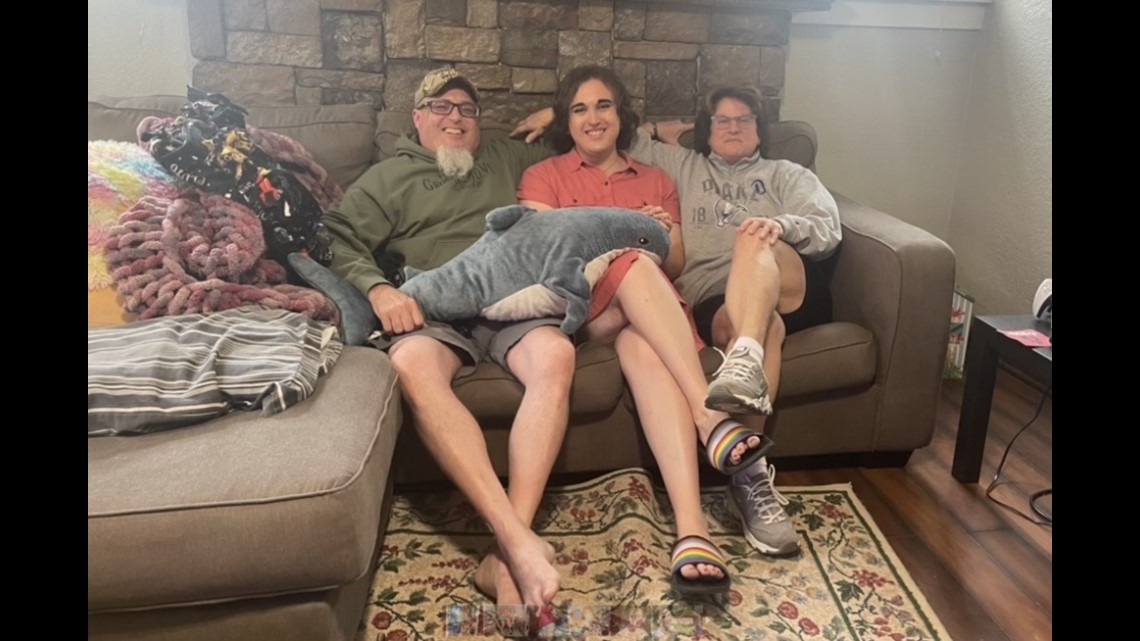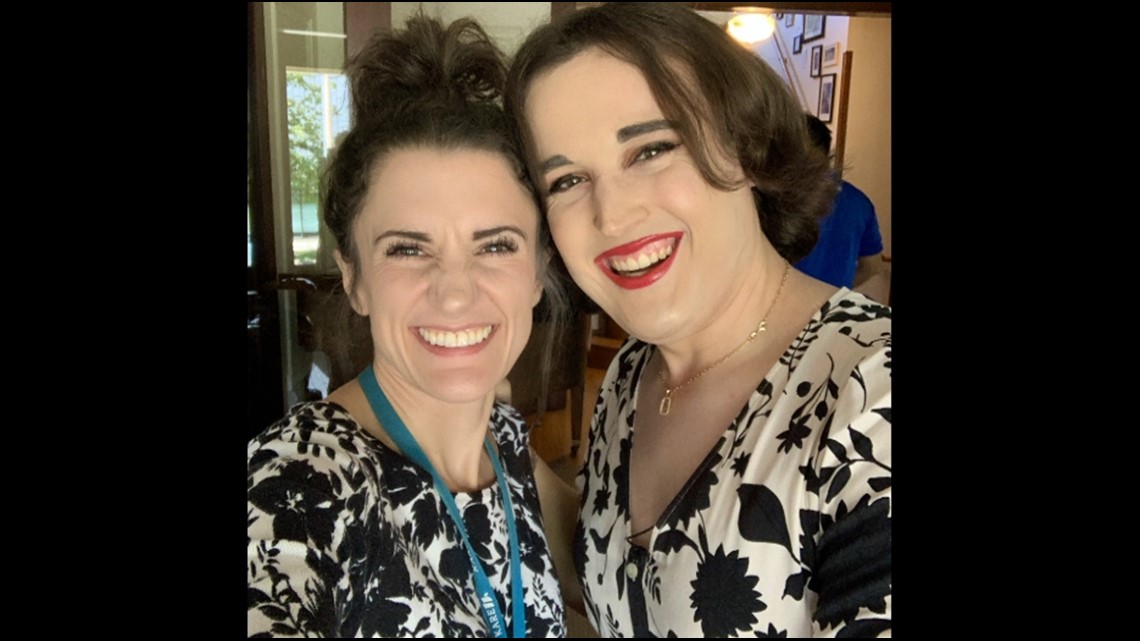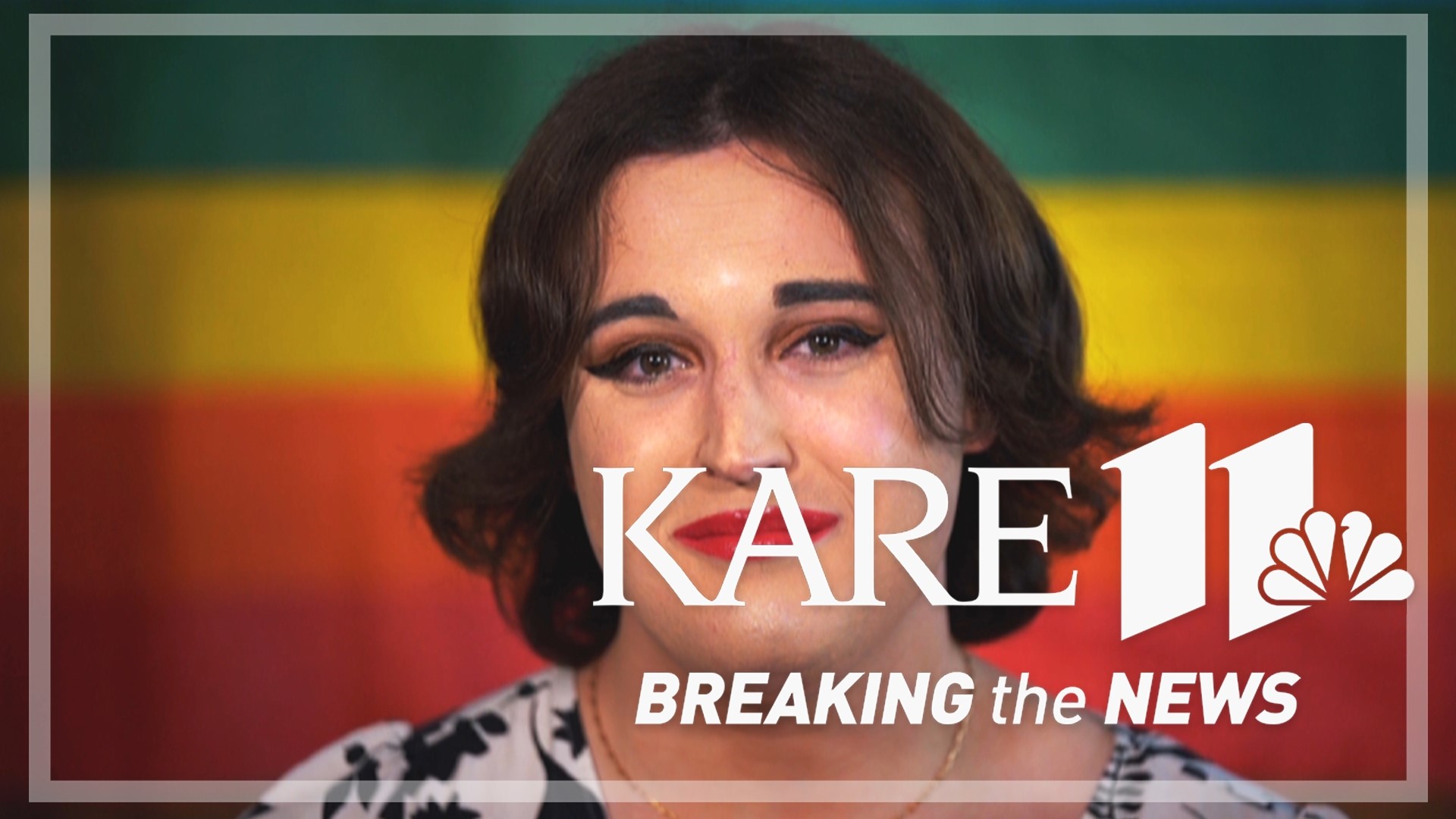DES MOINES, Iowa — Nora J.S. Reichardt has been reporting at Des Moines' Local 5 News since July of 2021, under a different name. After gradually coming into her identity as a transgender woman over the course of several years, the 24-year-old Hanover native began a medical transition process in September 2021. A year later, she is publicly re-introducing herself to the community and sharing her transition experience.
Reichardt sat down with KARE 11's Eva Andersen, a former reporter for Local 5 News, on the day she officially filed for her name change through the Iowa courts.
EVA ANDERSEN
What is your name, and what are your pronouns?
NORA J.S. REICHARDT
My name is Nora J.S. Reichardt. My pronouns are she her hers, and I am a transgender woman living in Des Moines and working for WOI Local 5 News.
ANDERSEN
How does that feel to be able to say?
REICHARDT
For a long time, I didn’t think that I would get to say that--at least not on air. I didn’t know if there was a place and a space for me to do this sort of work that I’ve really come to love and enjoy, while also getting to be myself while I do it.
To gradually come into a role where I am feeling more and more at home in my body than I really ever did before has been amazing to get to experience and share with people.
ANDERSEN
When did you first start realizing you were a transgender woman?
REICHARDT
In late high school I had some thoughts in that direction, but it was at a time growing up in a pretty rural area that I didn’t even have the language to describe what I was feeling.
[Editor's note: Reichardt is from Hanover, Minnesota. She said growing up, there were around 2,900 people.]
Especially early on, it’s hard to place that sense of wrongness--like I’m a person who’s wearing my body, and not a person who's living in it. I thought I was just depressed, I thought I was just anxious. And I’ve had those feelings almost as long as I can remember.
It’s very weird to approach every day at work as if it’s a dress-up day, but there were times that that’s really what it felt like--that I was just getting up every morning, putting on my nice shoes, my slacks and a button up, and going into work and telling all my coworkers and the people I was meeting out in the field that I was someone I didn’t really feel like.
Awhile after I started being on air, I kind of just reached a personal breaking point where I thought, why don’t I like the person that I am seeing every time I am going out in the field? Why don't I connect with that person? Why don't I want to be that person?
ANDERSEN
What did your transition process look like?
REICHARDT
The number one thing is it looks different for everyone. I started counseling last September. So I’ve been in some degree going through this process for about a year now.
As part of this process, I pursued a more medical intervention. I am on hormone replacement therapy. I am taking estradiol to increase my estrogen levels. I am also taking pills that will reduce my testosterone output.
There’s beauty in this process. And I wish that got discussed more. Especially among people who are cis and don’t find themselves as familiar with it. What I find is learning to love my body, love me, and just the way I want to live my life, it’s the best act of self-actualization that I could ever imagine.
[Editor's note: Reichardt also shares she began growing out her hair, picking out a new wardrobe, working on vocal training, and undergoing laser hair removal.]
There was a decent span of time where everyone in my life functionally knew me as Nora, except for the viewers at home. [I felt like] I was splitting myself in two.
ANDERSEN
Why did you decide to tell viewers now?
REICHARDT
When I made this exact leap of telling the viewers at home that everything was going to be different, that the little name under my headshot is going to look a little different now on air, and I wanted to personally feel as ready as possible to make that jump, because there are expectations that come with it.
ANDERSEN
Your name is now Nora. Why Nora?
REICHARDT
I had a list of about a dozen girl names that I thought were cute, and I just kind of experimented quietly with calling myself those different names, just seeing how they felt. After I spent a few weeks going through it, I marked all but a few finalists off, and Nora just kind of stuck.
And it’s something that was not intentional at the time, but I feel like it has become emblematic of me kind of shutting the baggage of the person I was appearing as in public because all four letters did appear and my dad name in some capacity.
And I kind of feel like I have dropped the parts of me that aren’t me. And taking what’s left into something better. Something more like me.
ANDERSEN
What was it like coming out to your family?
REICHARDT
When I finally sat them down...they still want to be my parents. And I love them so much, and I’m really, really grateful that they are still around for me. They want to support me in this.
I had friends who don’t get to have relationships with her parents anymore because of [coming out]. And not being accepted for being who they are...I was so scared of that pain.
What really stuck with me is when my mom told me that she doesn’t think she’d ever seen me this happy. And I feel the same way. To know that other people are seeing that too--especially my mom and dad, who I love so much; I can do anything as long as I still have them.


ANDERSEN
What advice do you have to people so they can be the best ally?
REICHARDT
When people tell you who they are, believe them. The very first thing that you tell someone after they come out to you really will dictate the tone of your relationship moving forward, for better or for worse. And I am very fortunate that almost everyone I have told has been nothing but immediately affirming and supportive.
Being trans is not a burden. If someone is trusting you with that information, it means that you mean something to them. And they really want to get to share that.
I hope if anyone is ever in that position where someone is telling you something like this about themselves, the best thing you can do is tell them, I’m glad. I’m glad that you trust me, I’m glad that you are being who you are, and what can I do for you? Everyone needs something different. Every trans person has different standards about their comfort level with their dead name, or things like that. Just ask. We are not scary, I don’t think. There’s a sense that because people don’t have exposure to people like me so often, that they don’t even know where to start.
Just start with the basics. What’s your name? Tell me about you.
For so much, especially for people who feel like they have a personal relationship, or a very strong one with a trans person, it’s understandable that it can feel like a loss. Especially for family members...that I’m not the person you thought I was for a really long time.
But the way I would ask people to reframe that is, you’re getting someone better. You’re getting some of that person is so much happier being and for them to get to share that with you, it’s a magical thing.
ANDERSEN
What are the parts of you that will stay the same?
REICHARDT
I’m still very much the person I was before. I still know too many Spider-Man facts. I still play a little too many video games for my own good. I still enjoy reading at the coffee shops around Des Moines which is where you can usually find me on my days off. None of that has changed.
I’m still someone who I think is inquisitive, passionate about what I do...and I’d like to think I’m pretty friendly.
One of my biggest guiding principles is that I hope everyone I meet is happy they met me, whatever the context of that interaction is. I just hope that I am a positive part in people's lives, big or small. And as long as that can say true through all of this, the rest is noise.



